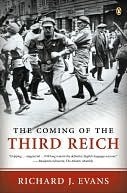More on this book
Community
Kindle Notes & Highlights
People make their own history, as Karl Marx once memorably observed, but not under conditions of their own choosing. Those conditions included not only the historical context in which they lived, but also the way in which they thought, the assumptions they acted upon, and the principles and beliefs that informed their behaviour.12
If the experience of the Third Reich teaches us anything, it is that a love of great music, great art and great literature does not provide people with any kind of moral or political immunization against violence, atrocity, or subservience to dictatorship.
The word ‘Reich’ conjured up an image among educated Germans that resonated far beyond the institutional structures Bismarck created: the successor to the Roman Empire; the vision of God’s Empire here on earth; the universality of its claim to suzerainty; in a more prosaic but no less powerful sense, the concept of a German state that would include all German speakers in Central Europe - ‘one People, one Reich, one Leader’, as the Nazi slogan was to put it.9
Military force and military action created the Reich; and in so doing they swept aside legitimate institutions, redrew state boundaries and overthrew long-established traditions, with a radicalism and a ruthlessness that cast a long shadow over the subsequent development of Germany. They also thereby legitimized the use of force for political ends to a degree well beyond what was common in most other countries except when they contemplated imperial conquests in other parts of the world. Militarism in state and society was to play an important part in undermining German democracy in the 1920s
...more
By the eve of the First World War, the use of German was mandatory in public meetings throughout the Reich, and land laws were being reformed in such a way as to deprive the Poles of their fundamental economic rights.33 The notion that ethnic minorities were entitled to be treated with the same respect as the majority population was a view held only by a tiny and diminishing minority of Germans. Even the Social Democrats thought of Russia and the Slavic East as lands of backwardness and barbarism by 1914, and had little or no sympathy for the efforts of Polish-speaking workers in Germany to
...more
By and large, then, the Jewish story in the late nineteenth century was a success story, and Jews were associated above all with the most modern and progressive developments in society, culture and the economy.54 It was developments such as these that made the Jews the target for disgruntled and unscrupulous agitators like Hermann Ahlwardt. For the disaffected and the unsuccessful, those who felt pushed aside by the Juggernaut of industrialization and yearned for a simpler, more ordered, more secure, more hierarchical society such as they imagined had existed in the not-too-distant past, the
...more
Wilhelm Marr, whose pamphlet The Victory of Jewdom over Germandom Viewed from a Non-confessional Standpoint, published in 1873, was the first to insist that, as he put it in a later work: ‘There must be no question here of parading religious prejudices when it is a question of race and when the difference lies in the “blood”’.59 Borrowing from the fashionable theories of the French racist Count Joseph Arthur de Gobineau, Marr contrasted Jews not with Christians but with Germans, insisting that the two were distinct races. The Jews, he declared, had gained the upper hand in the racial struggle,
...more
A historian once speculated on what would happen if a time-traveller from 1945 arrived back in Europe just before the First World War, and told an intelligent and well-informed contemporary that within thirty years a European nation would make a systematic attempt to kill all the Jews of Europe and exterminate nearly six million in the process. If the time-traveller invited the contemporary to guess which nation it would be, the chances were that he would have pointed to France, where the Dreyfus affair had recently led to a massive outbreak of virulent popular antisemitism. Or it might be
...more
It was Chamberlain who had the greatest impact, however, with his book The Foundations of the Nineteenth Century, published in 1900. In this vaporous and mystical work Chamberlain portrayed history in terms of a struggle for supremacy between the Germanic and Jewish races, the only two racial groups that retained their original purity in a world of miscegenation. Against the heroic and cultured Germans were pitted the ruthless and mechanistic Jews, whom Chamberlain thus elevated into a cosmic threat to human society rather than simply dismissing them as a marginal or inferior group.
Nietzsche was a vigorous opponent of antisemitism, he was deeply critical of the vulgar worship of power and success which had resulted (in his view) from the unification of Germany by military force in 1871, and his most famous concepts, such as the ‘will to power’ and the ‘superman’ were intended by him to apply only to the sphere of thought and ideas, not to politics or action. But the power of his prose allowed such phrases to be reduced all too easily to slogans, ripped from their philosophical context and applied in ways of which he would have greatly disapproved.


